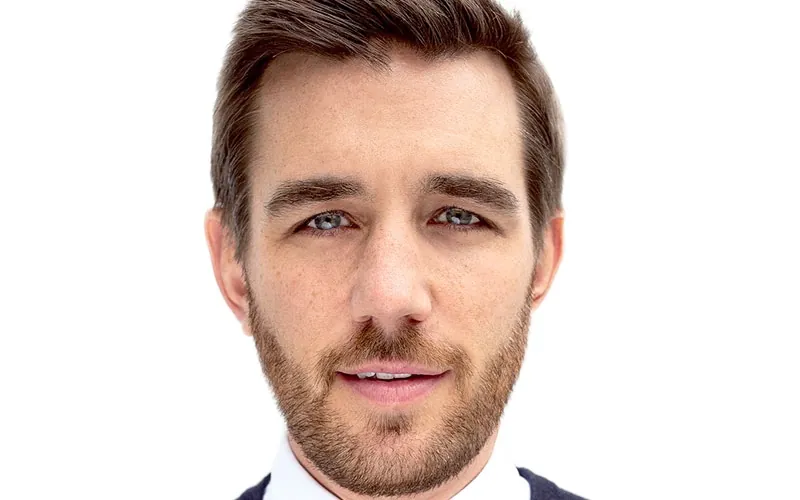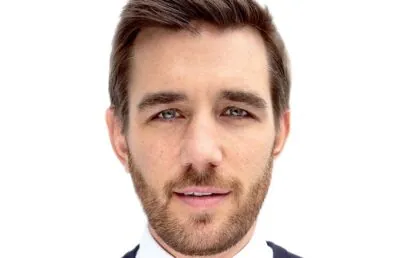A London-based platform spearheaded by a Sky Sports presenter is changing the dynamics of how influencers work on social media.
Alex Payne, CEO of The Influence Room, is looking to build something real with his business – connecting brands with influencers who genuinely care about their products and services.
The platform reverses the traditional model. Instead of brands hunting for creators, creators can apply to work with brands they admire to increase the chances of authentic content – and it was all born from first-hand experience.
A Star Wars-themed lightbulb moment
The concept was born out of a moment of professional frustration and a disinterest in one of the world’s most popular film series.
“I was actually sent a box with £500 worth of Star Wars merchandise in it to my place of work,” Payne told BusinessCloud.
“Books, games, DVDs, TV controls… all sorts of things alongside a very nice note at the top that said: ‘Alex, we hope you love this product. If you do, we’d love you to Instagram the fact that we’re showing Star Wars back-to-back on our movie channel all weekend.’
“The problem was that I’m someone that’s got absolutely no interest in Star Wars whatsoever. I haven’t seen it since I was eight, I don’t want the box, I don’t create Star Wars content and I don’t want to watch Star Wars films.”
The moment of disconnect sparked a bigger question for the rugby-mad entrepreneur.
He continued: “What I was left with at the end of that experience is the feeling of what a total waste of everybody’s time it had been. This is one of the most successful movie franchises in history and they are giving it to the wrong person at the critical point.
“Why can they not find 100 people at the click of a button who go, ‘I freaking love Star Wars, send me the box and I’ll create the content you’re looking for’?”
That became the founding principle of The Influence Room – a marketplace where influencers can find opportunities that they’d enjoy taking instead of being approached randomly.
A broad church
The platform has grown significantly since its launch in 2017. “Our membership is now 30,000 people of influence in the UK, all of whom have applied to be a member of The Influence Room,” said Payne.
“We vet them, and then we accept them based on the quality of their audience and their engagement.”
However, the platform isn’t just for fitness influencers or TikTok stars, and social media users who are in The Influence Room community are of all different sizes.
He explained: “We have very famous people on our platform who are household names in music, film, sport, television, fashion.
“Then we have small content creators who create the most amazing videos but don’t have an enormous social media following and we have everything in between.
“We’ve had days, for example, where we’ve had the entire England cricket team join the platform, because one of the England cricketers has picked up a jacuzzi deal, for example, through the platform for the summer and then suddenly all the England cricketers are joining. We’ve had the same thing with the Hollyoaks actors and the EastEnders crew.
“This is not a database of influencers – you become part of a community where we ask you to look after the brands that you love, deliver the content and then you come back for more.”
A UK core with expansion plans
While its influencer base spans international audiences, The Influence Room remains proudly UK-focused for now.
“We are predominantly UK-based in terms of the brands who use us,” said the TV presenter.
“Obviously, the influencers will have international followers, but we are very selective about ensuring that the influencers who join the platform have a 50% or more UK following.
“In terms of expansion, at the moment, we are looking at expanding into new territories. We’ve trialled it in the US, and that will need a bit more money but we have big plans upcoming.”
The plethora of big-name clients
Among the company’s most loyal clients is Virgin Media O2, which recently merged with Lancashire-based Daisy Group, led by Matthew Riley.
“They’ve been with us since we first started, and they’ve renewed every single year,” said Payne.
“I think I’m right in saying, anecdotally, it’s the first thing they sign off in their marketing budget every year.”
The platform is also used by Five Guys, Nissan, Virgin Voyages, HarperCollins and Pizza Express among others.
Payne said: “It really can be used by any brand doing anything. We’re particularly effective at that sort of top-of-funnel marketing – brand awareness and content generation. That’s our sweet spot.”
Redefining the influencer
One of Payne’s missions is to broaden the idea of who holds influence and what is defined as an influencer.
“If I asked someone about who influenced them, they probably wouldn’t reference social media stars,” he explained.
“They’d most likely talk about parents, teachers, sports coaches or heroes of their football team, or even bands that they follow.”
As a result, the platform welcomes a diverse user base, ranging from journalists to bloggers to content creators, who have genuine interest in the work available.
Payne added: “You are picking from people who are really keen to work with your brand.
“Often that can be time efficient and cost efficient, but you can find influencers with real, genuine connections, telling genuine stories into which your brand can be plugged.”
The journey so far
The startup launched in early 2017 and has grown steadily after being bootstrapped early on.
Payne explained: “We’ve probably now had about five or six years of proper trading. Then we’ve taken investment and have a very supportive group of angel investors.
“The investment has helped us develop the platform and we have around 22 staff.”
Despite huge market shifts and global crises, the business has stayed the course.
The CEO quipped: “I wouldn’t have put COVID in the middle of our early journey. I wouldn’t have put the war in Ukraine in the middle of it, or recession and inflation, but we are still evolving, we’re growing and we’re developing.”
“We’ve seen some of our biggest competitors raise huge amounts of money and then 18 months later, they go out of business.
“It’s been a very challenging market. But we are still powering on.”
The Good, The Gin, and the Rugby
Beyond The Influence Room, Payne also juggles two high-profile side projects.
The first is The Good, The Bad, and The Rugby – a podcast he runs with former England internationals Mike Tindall and James Haskell.
“We are a show that lives life through a rugby lens rather than a rugby shirt,” he said.
“We talk as much about mental health, the challenges of being parents and being 40, as we do the breakdown of the weekend’s games.”
Then there’s Blackeye Gin – a premium spirit that supports injured rugby players.
Payne said: “It’s got botanicals from every major rugby-playing nation and we raise £1m a year for injured rugby players through the sale of our gin.”
The road ahead
The Influencer Room, though, still remains Payne’s main priority.
“We’re constantly evolving our tech,” he added. “AI is obviously increasingly interesting and we’re embedding it into the platform now to help with opportunity curation, anticipated outcomes and influencer recommendations.”
Payne also sees potential for white-label versions of the platform, such as private communities for crowdfunders or brand advocates.
He explained: “If you’ve got 1,000 investors who each put in £100, you can put them into your community and engage them as ambassadors rather than just updating them quarterly.”
Through it all though, the principle of authentic, passion-led marketing is at the company’s forefront.
Payne concluded: “You can pick out at 100 yards an influencer collaboration where it jars – where the influencer is not doing it for any legitimate reason other than the cash.
“What this platform does is enable you to find the middle ground where both sides benefit, beyond just a transaction.”
How a Manchester global agency is facing up to the AI challenge


